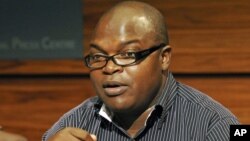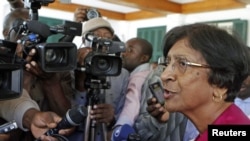HARARE - Civic activists in Zimbabwe have called on the United Nations to set up an office in the country to monitor what they say is the deteriorating human rights situation. The call comes after renewed political violence resulted in a senior member of Prime Minister Morgan Tsvangirai’s party being killed - allegedly by supporters of President Robert Mugabe’s ZANU-PF party.
Zimbabwean civil society groups want the United Nations to establish an office in the country to monitor growing human rights violations.
Abel Chikomo - a representative of non-governmental organizations - spoke to reporters in Harare Wednesday. He said, “We urge the U.N. to maintain a permanent presence in and focus on Zimbabwe, watching over the protection of human rights of all Zimbabweans through setting up a U.N. Human Rights Monitoring Office.”
Last week, Cephas Magura, a senior member of Prime Minister Tsvangirai’s MDC party, was killed in Mudzi district, about 300 kilometers east of Harare. A local media report said he was stoned to death. Among the suspects arrested was David Chimukoko, a local official with President Mugabe’s ZANU-PF party.
MDC leaders called the killing an example of renewed politically-motivated violence and intimidation.
For years, the party and human rights groups have accused ZANU-PF of arresting, beating, and killing MDC supporters.
The latest incident follows a ground-breaking five-day visit last month by the U.N. High Commissioner for Human Rights, Navi Pillay. She vowed to keep Zimbabwe under the spotlight.
"I will continue to watch the country and watch the protection of human rights of all Zimbabweans," said Pillay. "I will ask for a further visit and I am going to consider asking the government whether we can have a presence in the country [in the form of] a human rights advisor. That’s our mandate, which is to cover human rights.”
Zimbabwe’s human rights record has remained on the international radar for more than a decade. It started when President Mugabe and his supporters began forcing white farm owners off their land in 2000.
Elections in 2008 were so violent that regional leaders rejected the victory Mr. Mugabe had claimed over Mr. Tsvangirai. That led to the current and troubled power-sharing government between ZANU-PF and the MDC. The parties are in a deadlock over a new constitution and timing of elections, which must be held sometime in the next year.
Zimbabwean civil society groups want the United Nations to establish an office in the country to monitor growing human rights violations.
Abel Chikomo - a representative of non-governmental organizations - spoke to reporters in Harare Wednesday. He said, “We urge the U.N. to maintain a permanent presence in and focus on Zimbabwe, watching over the protection of human rights of all Zimbabweans through setting up a U.N. Human Rights Monitoring Office.”
Last week, Cephas Magura, a senior member of Prime Minister Tsvangirai’s MDC party, was killed in Mudzi district, about 300 kilometers east of Harare. A local media report said he was stoned to death. Among the suspects arrested was David Chimukoko, a local official with President Mugabe’s ZANU-PF party.
MDC leaders called the killing an example of renewed politically-motivated violence and intimidation.
For years, the party and human rights groups have accused ZANU-PF of arresting, beating, and killing MDC supporters.
The latest incident follows a ground-breaking five-day visit last month by the U.N. High Commissioner for Human Rights, Navi Pillay. She vowed to keep Zimbabwe under the spotlight.
"I will continue to watch the country and watch the protection of human rights of all Zimbabweans," said Pillay. "I will ask for a further visit and I am going to consider asking the government whether we can have a presence in the country [in the form of] a human rights advisor. That’s our mandate, which is to cover human rights.”
Zimbabwe’s human rights record has remained on the international radar for more than a decade. It started when President Mugabe and his supporters began forcing white farm owners off their land in 2000.
Elections in 2008 were so violent that regional leaders rejected the victory Mr. Mugabe had claimed over Mr. Tsvangirai. That led to the current and troubled power-sharing government between ZANU-PF and the MDC. The parties are in a deadlock over a new constitution and timing of elections, which must be held sometime in the next year.





